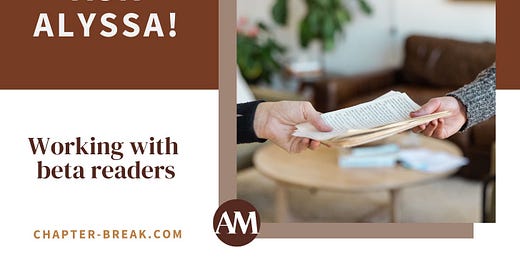Read this before getting beta readers 📖
Answering your questions about finding and working with betas
Let’s be honest: handing over your book for feedback can be scary. But you know it’s critical to grow as a writer and put the best possible version of this story forward.
If you’re just dipping your toes in getting constructive feedback, you might have considered turning to beta readers. But where do you even begin searching for betas? At what point should you send your manuscript to them? And when you get their feedback, how do you know what changes to implement and what to set aside?
Today, I’m covering everything you need to know about working with beta readers. Here’s what we’ll discuss:
What’s the difference between a beta reader, a critique partner, and a professional editor?
Do you really need beta readers?
How can you find beta readers?
When should you give your book to beta readers?
What precautions should you take before sending your work to beta readers?
How can you distinguish good beta reader feedback from bad?
What’s the difference between a beta reader, a critique partner, and a professional editor?
While a beta reader, a critique partner, and a professional editor can all provide feedback on your story, they will come at it from different perspectives and with different intents, so it’s important to know what each one can provide:
Beta readers: With a beta reader, the idea is that you are testing out your potential reader for the book. So, if you're writing a romance, then ideally your beta reader is going to be someone who loves romance. The feedback that they are going to provide is not necessarily from the perspective of someone who understands or practices the craft of writing or someone who is a professional editor. They're coming at it from a reader's perspective primarily. For example, they can provide a “gut check” on whether your book is meeting expectations for the genre or give you broad-strokes notes on aspects they liked and aspects they didn’t like.
Critique partners: A critique partner is typically also a writer with whom you are exchanging drafts for mutual feedback. They are not necessarily someone who writes or reads within your genre (though they might very well be). But even if they don’t read or write in your genre, they should be able to understand what you are trying to accomplish with your story and provide constructive editorial feedback. Typically, in a critique partner setting, you are also providing them feedback, so it goes both ways.
Professional editors: In a professional editorial collaboration, you are hiring someone for their editorial expertise, not necessarily because they are an avid reader of your genre or are also a writer working on a book, though your professional editor should certainly have experience editing your genre. They will provide tactical suggestions on how to revise your manuscript to make it stronger, identifying weak points and outlining specific ideas and approaches you can take to remedy them.
You can get excellent feedback in all three of these different scenarios, but the key is to make sure you're getting the type of feedback that you want at this stage. For instance, a professional edit is going to look very different than a beta read; it is going to be much more comprehensive in giving you specific suggestions on how to improve your work, and is typically going to require a significant investment.
Regardless of whether you work with beta readers, a critique partner, or a professional editor, or some combination of these, it's important that you find someone who understands what you are trying to do and can provide fresh eyes on your story, because everyone needs someone to check their blind spots.
Do you really need beta readers?
Keep reading with a 7-day free trial
Subscribe to Chapter Break to keep reading this post and get 7 days of free access to the full post archives.



